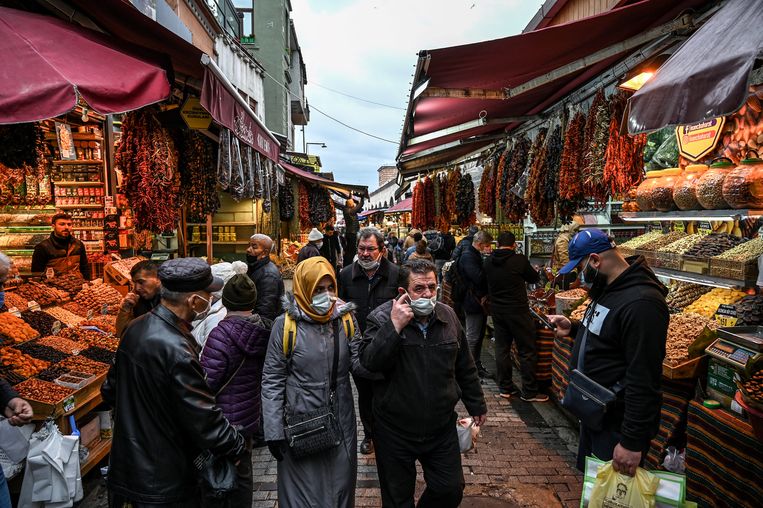President Erdogan’s unconventional monetary policy is seeing his support waning, but it’s too early to write it off. Erdogan will probably pull all sorts of things again.
Turkish President Recep Tayyip Erdogan on Friday urged citizens to keep all their bank balances in lira. Erdogan said that Turks should trust their national currency. “Let’s not forget one thing,” said the president. “If we don’t take our currency as the standard, we are doomed. The Turkish lira is our own money. We will go ahead with it. Not with some foreign currency.”
It was another attempt by Erdogan to avoid the financial crisis in his country. Inflation rose to 36 percent on an annual basis last month, according to the Turkish Statistical Office Tüik, the highest level since Erdogan came to power with his Justice and Development Party 19 years ago. According to Enag, a group of independent economists and former government officials, inflation was actually 83%.
More and more people are finding it difficult to make ends meet. There are long queues at the stalls selling subsidized “general bread” and many people convert their savings into dollars, euros or gold.
Inflation in Turkey is worse than in other countries, because the Central Bank of Turkey has recently cut interest rates several times on the instructions of Erdogan. Independent economists advise raising interest rates in the event of a currency depreciation. The president is convinced that raising interest rates will fuel inflation. He pointed out that the devaluation of the lira boosts exports and tourism. Moreover, Erdogan calls the concern, like many of his loyal Muslim supporters, a sin. “Interest, interest down. My friends, let’s take that out of our dictionary,” he said on Friday. “Interest makes the rich richer and the poor poorer.”
cheap credits
Erdogan is taking a big gamble with this unconventional approach. The moderate Islamist leader owes his popularity in large part to the wealth growth that Turkey has achieved under his rule over the past two decades. He managed to achieve this growth through prudent fiscal policies, ever-increasing consumption, and an unstoppable frenzy of building, fueled by relatively cheap credit.
Now that many Turks have suffered a heavy blow to their wallets, support for his policy has waned. In opinion polls, joint opposition parties now perform as well or better than Erdogan’s Justice and Development Party (AKP) and its partner in government, the Nationalist Movement Party (MHP).
“We are facing a government that is nearing the end of its life,” Istanbul Mayor Ekrem Imamoglu, the rising star of the opposition, said recently. “They pile on the error.”
To prop up the Turkish currency, Erdogan has made the central bank buy liras worth billions of dollars. It also introduced a guarantee system to protect savings from the depreciation of the lira exchange rate. He raised the minimum wage by 50 percent starting in the new year, public servants’ salaries by 30 percent, and state pensions by 66 percent. However, economists fear that all of this will not be enough or even counterproductive. “Unfortunately, all wage increases will disappear in a couple of months,” tweeted chief economist Jezem Öztuk Altinsak of the employers’ club TUSIAD.
Unfortunately, all the wage increases faded in two months.
– GizemAltinsac January 3, 2022
According to experts, the crisis reveals the weakness of Erdogan’s authoritarian style of governance. Especially since the major anti-government protests in 2013 and the attempted coup in 2016, the Turkish president has increasingly become the sole ruler. He carried out large-scale purges in the government apparatus, pushed loyalties in the judiciary, academia, and the media, and arrested many critics and suspected dissidents. Meanwhile, the president hardly has any good advisers around him and is surrounded mainly by family members and strikers.
He also has the central bank in his grip. Erdogan has fired three central bank governors since July 2019.
“Anyone who still has any degree of criticism of Erdogan has resigned or been expelled from the AKP,” said Turkish expert and former MEP Just Lagendyk, who lives in Istanbul. The party became Erdogan’s applause. As a result, the president sometimes seems to lose sight of reality.”
Centenary of the founding of the Republic
However, according to independent observers, it is too early to write off Erdogan. Elections won’t take place until 2023 and Erdogan still has the support of nearly a third of the electorate.
The hard-line core of his conservative Islamist supporters accepts his suggestions that the current crisis is the result of the dark machinations of a secret international. Lobby interest (“interest lobby”). Moreover, the opposition parties are divided among themselves, in terms of ideology and personalities. Erdogan has every proven means to make the lives of his opponents miserable. Last week, for example, the banking regulator had already filed a complaint against about two dozen critics of Erdogan’s monetary policy, including Dormus Yilmaz, the former governor of the central bank.
“It is likely that Erdogan will pull all the stops again in the near future,” Lagendyk says. Turkey celebrates the centenary of the modern republic in 2023. Erdogan is eager to be re-elected as president. In the end, it’s all about staying in power.”

“Coffee buff. Twitter fanatic. Tv practitioner. Social media advocate. Pop culture ninja.”











More Stories
Telenet Again Loses Tens of Thousands of Customers in Q4 Due to ‘Cord Outage’ – IT Pro – News
Belgian businessman saves Flemish stores from collapsing fashion chain Scotch & Soda
Bosman transfers the company to the Finns.